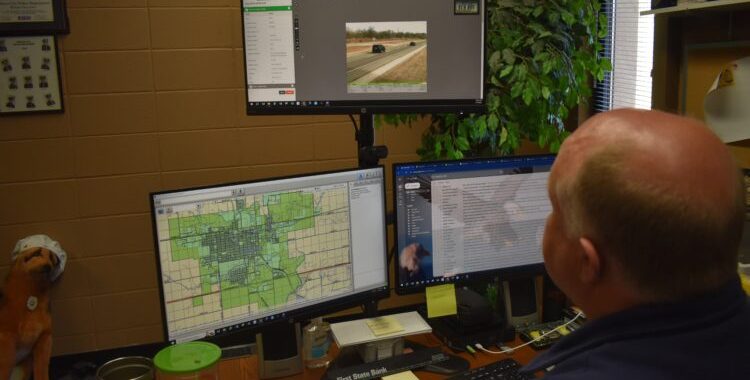Call them automated traffic control devices if you want, but the four cameras on the south fringes of Webster City pretty much monitor one thing: speed.
To the drivers who pay the citations they are all about money.
If you blast past the speed cameras installed last fall on U.S. Highway 20 and Iowa Highway 17 going 11 miles per hour or more over the speed limit, you’re going to get a surprise in the mail.
And it’s an unhappy surprise.
How unhappy?
Webster City has pocketed $555,887 since the cameras went live in November.
Its take is roughly two-thirds of the gross amount the speed cameras generate for the city and the firm that operates the cameras: Sensys Gatso Group, or Gatso. Gatso’s take during that same time period is more than $250,000.
It takes maybe 12 Webster City Police Department hours each week to perform its role in the speed camera citation process, according to Police Chief Shiloh Mork.
“Honestly, I’ve been afraid to estimate it,” he said.
Three Webster City Police officers, one of them the chief, comb through the traffic camera information, confirming violations that deserve citations.
“Anything that triggers a camera goes straight to the Gatso company in Massachusetts, and they take the video and those shots from the cameras, get the license plate information and then they have access to the databases to find out who the car belongs to.”
Sensys Gatso Group calls itself the leading global provider of “traffic safety solutions delivering systems, software and services primarily for automated traffic enforcement,” according to its website. It’s based in Sweden.
Once Gatso makes sure license plates match a vehicle, the company sends the information to the Webster City Police Department. They then confirm the identity of the vehicle and that there was a speed violation.
Then, Mork said, “it goes back to the company and then they send out the citation.”
It takes about two weeks from the click of the camera to the moment WCPD processes the information, he said.
The day he explained this, Mork showed that more than 1,000 citations were awaiting WCPD approval.
“In all honesty, calls for service come first for us,” he said. “So that’s why we have 1,000, 1,100 backlog. Because we’ve been busy doing everything else.”
It’s a time consuming process. “They claim that if you do enough, you can do 15 seconds per violation. If you are one person and that’s all you do, maybe. If you’re going through the process of looking at three photographs and confirming everything, that’s not 15 seconds.”
Back in 2023, when the topic of automated traffic control devices was discussed by the City Council of Webster City, Mork was asked for his thoughts.
“I was on record as saying if the purpose of the cameras is for safety I’m all for it,” he said. “If it’s strictly to generate revenue, I don’t like it.”
One thing is for certain: It is generating revenue.
Of the $199,458 gross from 1,853 paid citations dated December 26, 2023 to January 11, 2024, Gatso, after some minor adjustments, earned $64,855.
Webster City got $134,318.
The enforcement camera revenue goes into a line item in the General Fund created by the city’s Finance Director Dodie Wolfgram especially for the speed camera revenue. That line, when this story was written, was $555,887.
Citation money is remitted to the city twice a month.
When the City Council of Webster City agreed to the Gatso contract, it talked about using the income for public safety. Mork said some of it is earmarked for a new police cruiser. But at the time of her interview Wolfgram said the money had not yet been spent.
Now for some bad news.
“We’ve been called names. Money stealers. Personal attack on the officers. Threat of civil lawsuits against the officers that approve the tickets. And then the comments that ‘I will never come to your town again, will never spend the time in your town again,’” Mork said. “People call, they will send nasty emails, they will send nasty letters not only to the Police Department, but to City Hall.”
The minimum fine for a traffic camera citation is $105 dollars. The fines go up with a vehicle’s speed.
“I know we have had 100 miles an hour on Highway 20,” Mork said. “And we’ve had 80 miles an hour on Highway 17.”
Though costly, the citation for speed through the camera system doesn’t go against a driver’s license, and it doesn’t get reported to insurance, Mork said. The system hinges on people voluntarily paying. “So there’s really not a whole lot we can do about it,” he said.
But there’s one more thing about speed cameras.
“People have very strong opinions of them,” Mork said, “but the bottom line is speeding. You know, we’ve had people that have complained that while I had my cruise control set at 10 over there’s no way I was going 11 over. But you knowingly were going 10 over the speed limit. That’s not much of a defense.”
The city has a five-year contract with Gatso. Should the Iowa Legislature vote to approve the current bill that seeks to disallow automated traffic control devices in the state, that could mean they would have to be removed.
In the meantime, the cameras are clicking.
View the article as it originally appeared in the Daily Freeman-Journal.
Last modified: March 21, 2024

